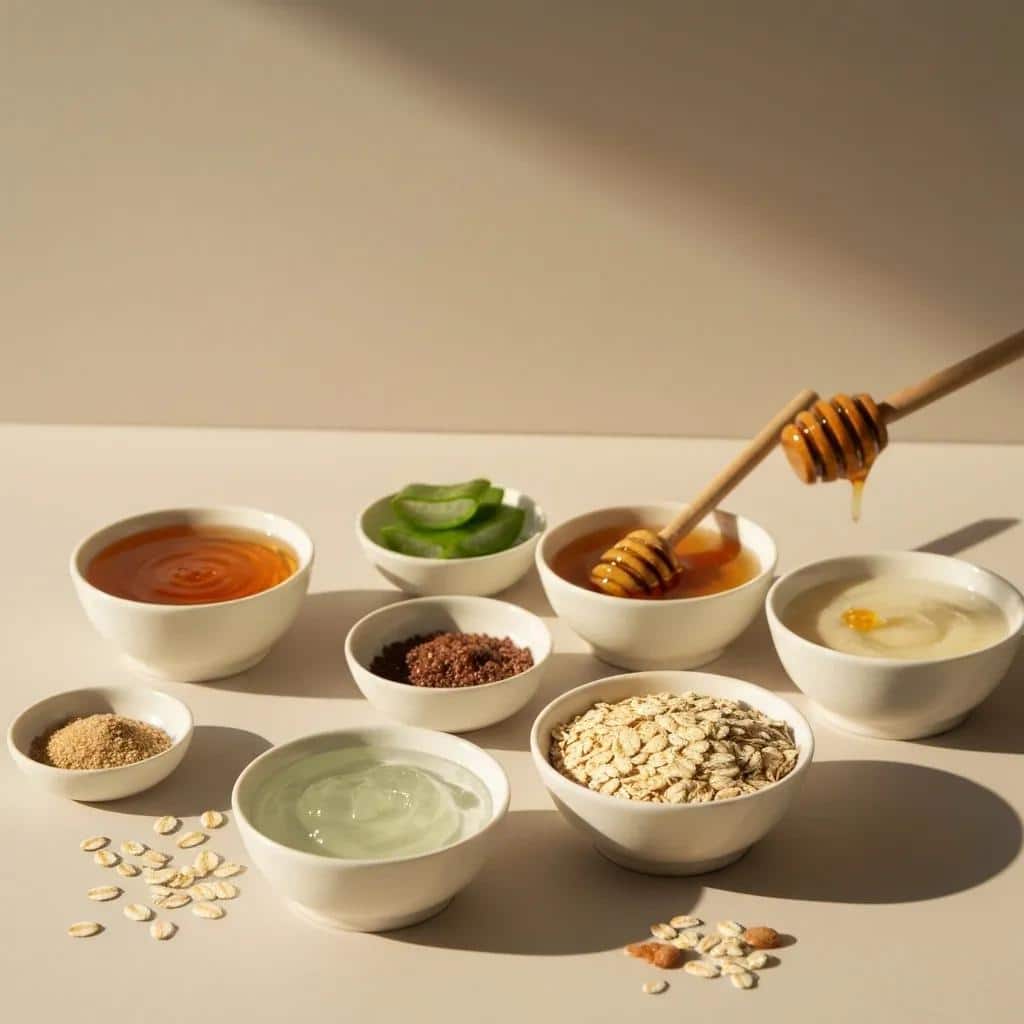DIY Skincare: Natural Recipes for Glowing Skin to Nourish and Revitalize Your Complexion!
What Are the Best Natural Ingredients for Glowing Skin?
| Ingredient | Key Mechanism | Primary Benefit |
|---|---|---|
| Aloe Vera | Polysaccharide hydration | Soothes irritation |
| Honey | Natural humectant & antibacterial | Locks in moisture |
| Turmeric | Curcumin-mediated brightening | Reduces dark spots |
| Vitamin E | Lipid-soluble antioxidant | Protects against free radicals |
| Essential Oils | Volatile phytonutrients | Enhances skin tone & aroma |
How Does Aloe Vera Hydrate and Soothe Skin?
What Are the Antibacterial and Humectant Properties of Honey?
Honey: A Therapeutic Agent for Disorders of the Skin
A comprehensive review of scientific evidence highlights honey’s potent antimicrobial activity against various skin-relevant microbes and its ability to modulate the skin’s immune system. Specifically, Manuka honey has been scientifically recognized for its anti-microbial and wound-healing properties, leading to its clinical use as a topical treatment for wound infections and its potential in treating other skin conditions.
This research supports the article’s claims regarding honey’s natural humectant and antibacterial properties, which help lock in moisture and combat blemishes.
How Does Turmeric Brighten and Reduce Dark Spots?
Curcumin: A Novel Treatment for Skin-Related Disorders
Curcumin, the active compound in turmeric, exhibits significant antimicrobial, antioxidant, and anti-inflammatory activities. Research suggests its utility in treating various dermatological conditions, including dyspigmentation, by inhibiting melanin synthesis and tyrosinase enzyme activity, which contributes to reducing dark spots and evening out skin tone.
This citation verifies turmeric’s mechanism for brightening skin and reducing dark spots through its curcumin compounds, as discussed in the article.
Why Is Vitamin E Essential for Skin Antioxidant Protection?
Systemic Vitamin E in Modern Skin Therapy: A Comprehensive Review
Vitamin E, a crucial lipid-soluble antioxidant, plays a significant role in protecting the skin from oxidative stress and damage caused by free radicals, particularly from UV radiation. Its cellular functions are linked to photoprotective properties, making it a key ingredient in preventing cellular damage and preserving skin firmness.
This research substantiates the article’s explanation of why Vitamin E is essential for skin antioxidant protection and its role in safeguarding cell membranes from oxidative damage.
Which Essential Oils Are Safe and Effective for Skin Health?
How Can You Make Homemade Face Masks for Every Skin Type?
- Hydrating gel masks for dry and sensitive complexions
- Exfoliating honey-oatmeal masks for smooth, balanced skin
- Brightening turmeric masks for hyperpigmentation
- Clay-based masks for oily and acne-prone types
- Soothing yogurt masks for redness and inflammation
What Are Easy Aloe Vera Face Mask Recipes for Dry and Sensitive Skin?
How to Prepare Honey and Oatmeal Masks for Hydration and Exfoliation?
What Are Turmeric Face Mask Recipes for Dark Spot Reduction?
How to Customize Clay Masks for Oily and Acne-Prone Skin?
What Safety Tips Should You Follow When Using Homemade Masks?
Which Homemade Serums and Oils Target Specific Skin Concerns?
- Anti-aging rosehip and vitamin E blends
- Hydrating hyaluronic acid-based serums
- Acne spot treatments featuring manuka honey
- Essential oil complexes for overall skin health
What Are Effective DIY Toners and Cleansers for a Natural Skincare Routine?
- Apple cider vinegar toners for oily skin
- Green tea toners for sensitive complexions
- Oatmeal-based soothing cleansers
- Oil-based makeup removers and skin conditioners
How Do Natural Moisturizers and Balms Nourish and Protect Skin?
- Shea butter body butters for head-to-toe nourishment
- Coconut oil balms and lip balms for targeted moisture
- Simple cream recipes for daily facial hydration
- Customizable blends to suit varying skin needs
Why Is Understanding Ingredient Benefits and Safety Crucial in DIY Skincare?
- Scientific properties underpin efficacy and guide usage
- Antibacterial mechanisms support targeted treatments
- Patch testing and dilution protocols prevent adverse reactions
- Proper storage preserves potency and prevents contamination
- Identification of irritants ensures compatibility with sensitive skin
How Often Should You Use Homemade Skincare Remedies for Best Results?
- Face masks: 1–3 times per week by skin type
- Serums: daily or nightly depending on active concentration
- Toners and cleansers: twice daily to maintain clarity
- Moisturizers and balms: as needed, typically morning and evening
Where Can You Find Resources and Tools to Enhance Your DIY Skincare Experience?
- Skin-type quizzes for tailored ingredient selection
- Ingredient dilution calculators for safe essential oil use
- Libraries of high-quality images and tutorials
- Writing assistants to craft clear, trustworthy guides



